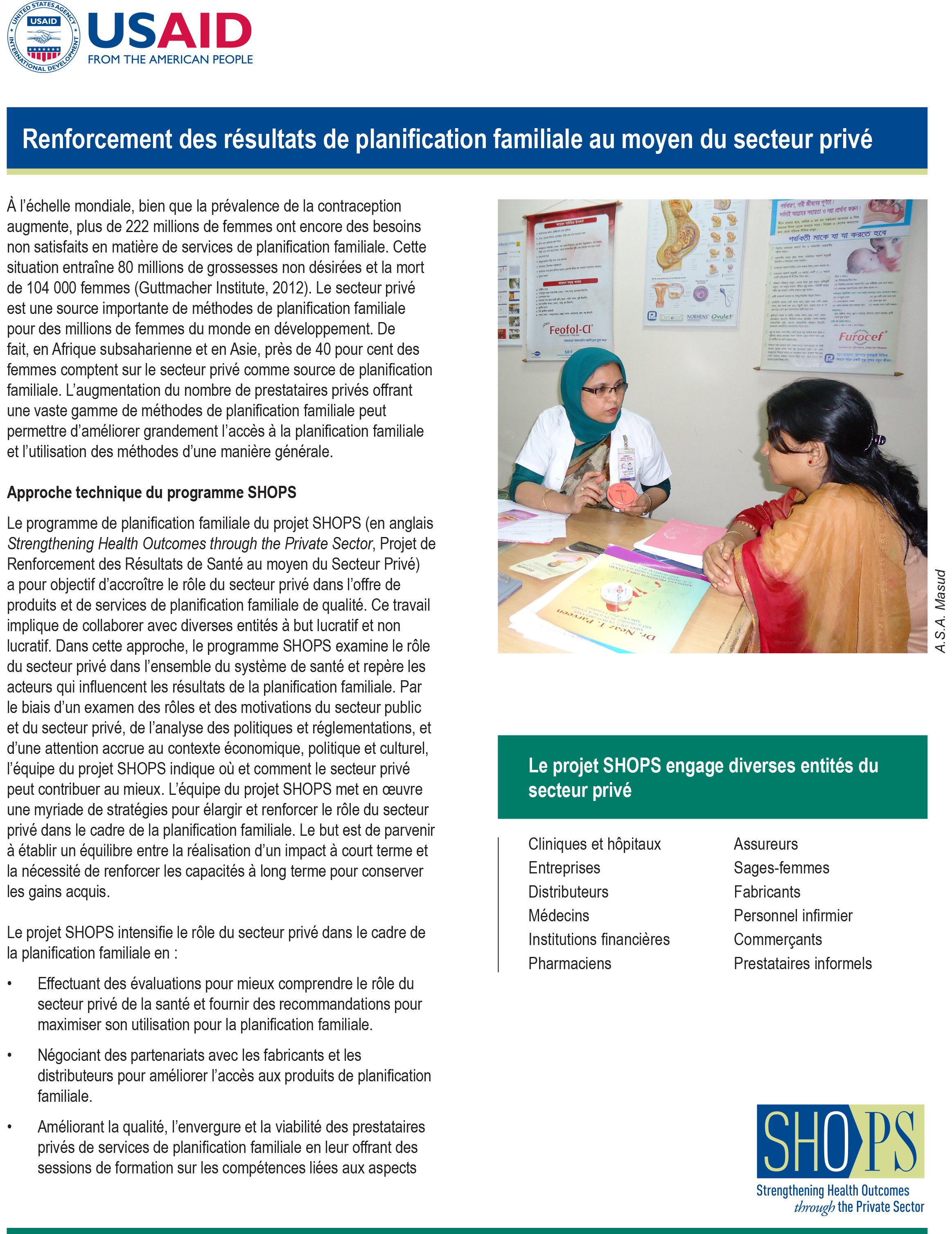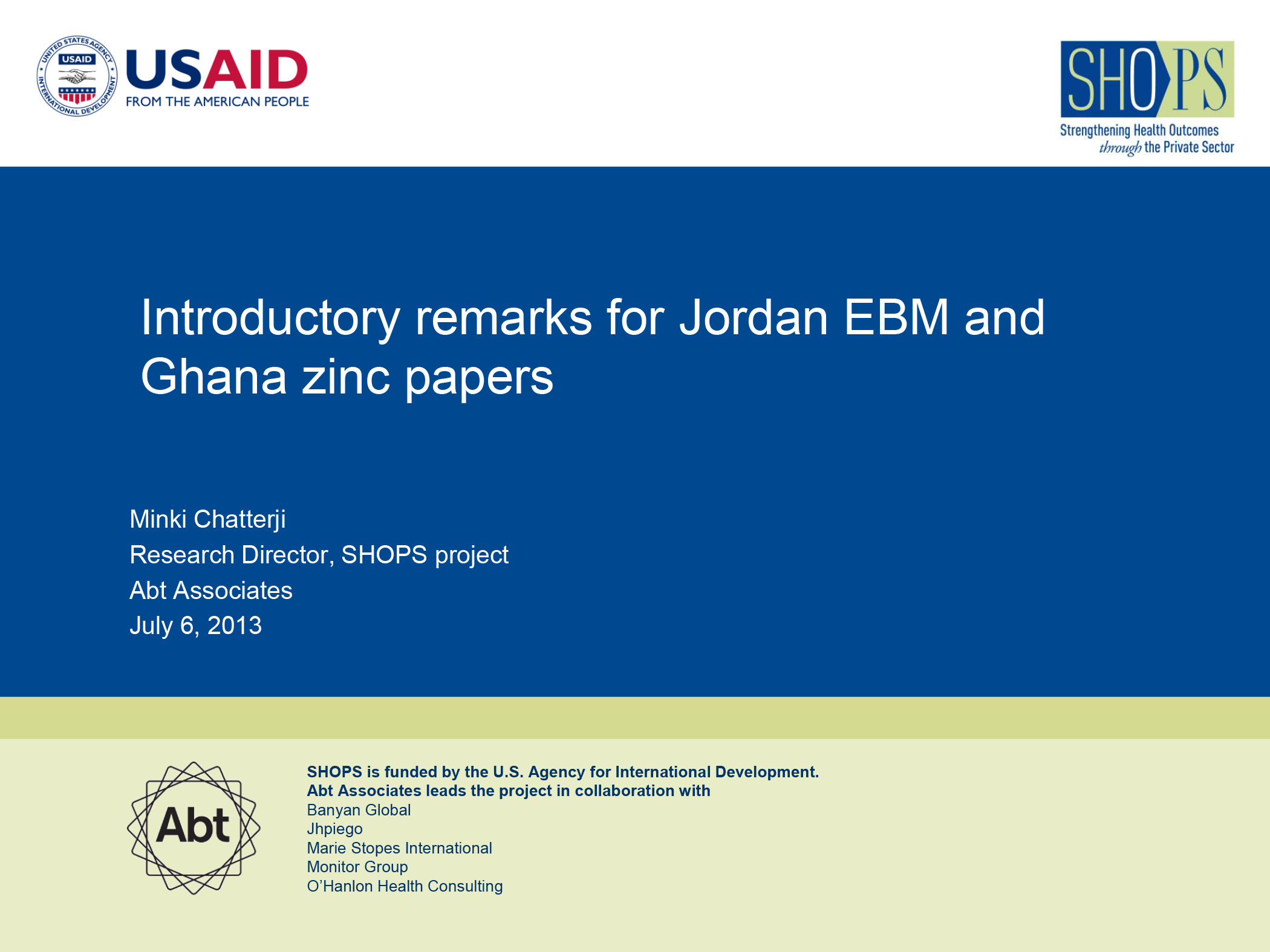
Resource Library
Renforcement des résultats de planification familiale au moyen du secteur privé
This fact sheet provides a brief overview of how the SHOPS project increases the role of the private sector in the provision of quality family planning products and services, with examples from Bangladesh, India, Jordan, and Nigeria.
Resource Type : Brief
Country : Bangladesh, India, Jordan, Nigeria
Year : 2013-11-25T00:00:00
Language : French
Project : SHOPS

Resource Library

Saving Lives and Fulfilling Destinies through Family Planning
In sub-Saharan Africa and Asia, close to 40 percent of women go to the private sector for their family planning needs. In this video, Ayodele Iroko, chief of party of SHOPS Nigeria and Susan Mitchell, director of SHOPS, discuss how the private sector plays a critical role in family planning. Ayodele and Susan highlight accomplishments from SHOPS project-led family planning activities implemented in Nigeria, Bangladesh, and Jordan.
Resource Type : Video
Country : Bangladesh, Jordan, Nigeria
Year : 2013-11-13T12:00:00
Language : English
Project : SHOPS

Resource Library
Family Planning Voucher Redemption Analysis
This report reviews a community outreach program targeting low-income women with family planning counseling and services in an effort to expand the access, quality, and use of family planning services in Jordan. Community health workers (CHWs) provided low-income women with vouchers for free family planning services and contraceptives at a private physician’s clinic; however, approximately 50 percent of the women receiving the vouchers did not redeem them. To determine why the vouchers were unredeemed, focus groups with CHWs and individual outreach clients were conducted. Findings and suggestions for improvement are discussed in the report.
Resource Type : Report
Country : Jordan
Year : 2013-10-04T00:00:00
Language : English
Project : SHOPS

Resource Library
Jordan Family Planning Users’ Profiles and Market Segmentation Analysis
The purpose of this review is to understand the market size for family planning (FP) methods in Jordan, the way the market is divided along demographic, socioeconomic, cultural, and other factors, and the role that the public, private, and NGO providers play in meeting current and potential demand in Jordan. Profiles of users and non-users of FP methods show disparities by age, socio economic status, method sources, and barriers against use. Supply-side barriers to prescribing a modern FP method include a continued bias towards “checking for fertility,” knowledge deficit, misconceptions among health providers, and lack of proper FP counseling. The market for potential users of modern FP methods is estimated to be 246,970 women.
Resource Type : Report
Country : Jordan
Year : 2013-10-04T00:00:00
Language : English
Project : SHOPS

Resource Library
Family Planning Focus Group Discussions among Married Women of Reproductive Age in Jordan
This report presents the results of 12 focus group discussions. The focus groups identified in-depth psychological, sociological and cultural factors affecting the use of modern family planning methods among married women in Jordan. Focus group discussion topics include family planning perceptions, motivations to switch from traditional to modern family planning methods, family planning decision making, and general family planning information.
Key findings include:
- Having a child as early as possible after marriage is preferable because of perceived social pressures
- The main reason preventing women from adopting modern birth control methods is the impact it would have on their bodies and the possibility of it impacting future fertility
- Extended families are influential in family planning and family size decisions
- Participants have a preference for IUDs and the pill as family planning methods
Resource Type : Report
Country : Jordan
Year : 2013-10-04T00:00:00
Language : English
Project : SHOPS

Resource Library
Talk About Impact: SHOPS Jordan Director Reed Ramlow on the Private Sector and Family Planning (Transcript)
This is a transcript of the video, Talk About Impact: SHOPS Jordan Director Reed Ramlow on the Private Sector and Family Planning
Resource Type : Other
Country : Jordan
Year : 2013-06-01T00:00:00
Language : English
Project : SHOPS

Resource Library
How Evidence Based Medicine Affects Private Sector Doctors
This study examines the impact of an evidence-based medicine (EBM) intervention in Jordan that used roundtable seminars discussing research evidence on DMPA to dispell providers' misconceptions regarding injectable hormonal contraceptives. The randomized study seeks to understand whether or not this intervention is effective in changing providers' knowledge about DMPA. The presentation was made by Minki Chatterji at the Private Sector Pre-Day to the International Health Economists Association's World Congress in July 2013.
Resource Type : Presentation
Country : Jordan
Year : 2013-07-08T00:00:00
Language : English
Project : SHOPS

Resource Library

Jordan Ta'ziz IUD Campaign Commercial #3
The Strengthening Family Planning project ("Ta'ziz Tanzim Al Usra," in Arabic), launched a national campaign this spring in Jordan that promotes the use of family planning pills as a safe and effective method for couples who want to space their children and plan their family size.
Resource Type : Video
Country : Jordan
Year : 2013-07-03T12:00:00
Language : Arabic
Project : SHOPS

Resource Library

Jordan Ta'ziz IUD Campaign Commercial #2
The Strengthening Family Planning project ("Ta'ziz Tanzim Al Usra," in Arabic), launched a national campaign this spring in Jordan that promotes the use of family planning pills as a safe and effective method for couples who want to space their children and plan their family size.
Resource Type : Video
Country : Jordan
Year : 2013-07-03T12:00:00
Language : Arabic
Project : SHOPS

Resource Library

Jordan Ta'ziz IUD Campaign Commercial #1
The Strengthening Family Planning project ("Ta'ziz Tanzim Al Usra," in Arabic), launched a national campaign this spring in Jordan that promotes the use of family planning pills as a safe and effective method for couples who want to space their children and plan their family size.
Resource Type : Video
Country : Jordan
Year : 2013-07-03T12:00:00
Language : Arabic
Project : SHOPS
Pagination
- Previous page
- Page 3
- Next page







